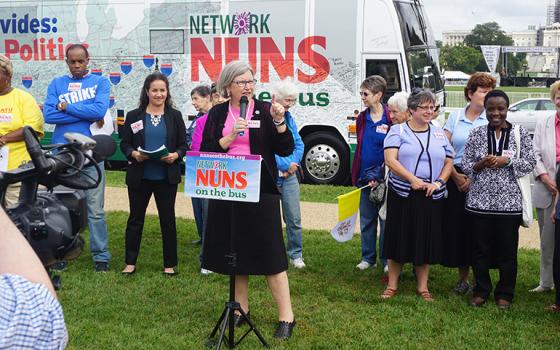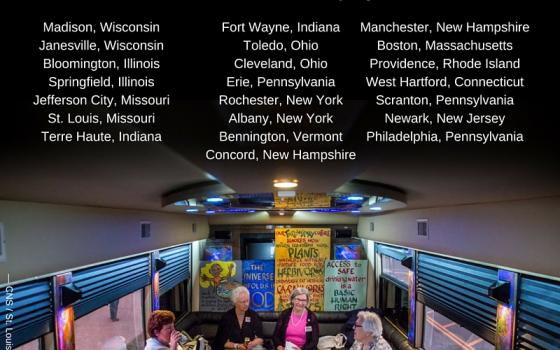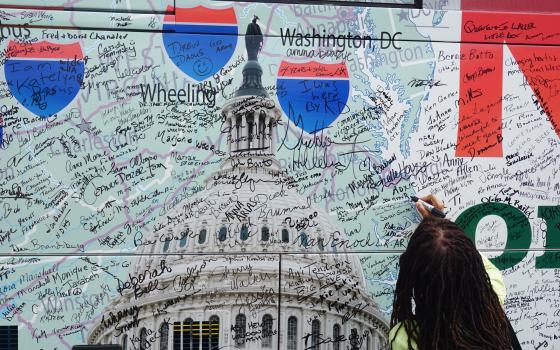Once again, Global Sisters Report is following the Nuns on the Bus tour closely, providing updates in news and on our Nuns on the Bus Blog, including posts from the road. Look for contributions from Sister of St. Joseph of Peace Susan Francois and Religious Sister of Mercy Larretta Rivera-Williams from the first leg of the trip and from Sister for Christian Community Alison McCrary and Franciscan Sister of Clinton, Iowa Jan Cebula after July 19.
______
When the Nuns on the Bus get rolling July 11, they'll be headed for the "gaps" in society, the places where the powerless left behind in the U.S. economy can be found
They'll also visit the politically powerful, gathered at their conventions to anoint the next presidential candidates, in hope of making the case for mending the growing breach between rich and poor.
It's a variation on a persistent theme for Sr. Simone Campbell, the 70-year-old executive director of NETWORK, the Catholic social justice network that launched the annual bus tour in 2012. This year's version, "Mend the Gaps," will focus on promoting policies that bridge divides in the United States, with a special focus on policies that affect women and people of color.
The bus, which is wrapped in signs heralding the work of women religious, will visit 22 cities in 13 states, including stops in Cleveland during the Republican National Convention (which runs July 18-21). The final stop will be July 26-29 in Philadelphia, while the Democratic National Convention is underway.
About 10 sisters join Campbell and staff from NETWORK on each leg of the trip. Global Sisters Report's Sr. Jan Cebula is among them for the third time; she will board in Cleveland.
The bus tour has evolved into an annual rite of spotlighting social ills by elevating the stories of individuals, neighborhoods and organizations and calling attention to the deficiencies of inequitable systems.
"We keep saying [the need for the bus campaign] is over," said Campbell, a member of the Sisters of Social Service and a lawyer, during a pre-trip interview in NETWORK's Washington office. "But the need is so great. The need is so compelling."
Campbell is especially focused on the income gap, or the growing separation between the top earners and those on the bottom. She took the NETWORK staff to the steps of the Lincoln Memorial at one point to demonstrate the "crisis of income disparity" by way of a "human bar graph."
Her argument: Between 1949 and 1979, everyone's income went up 100 percent.
"Granted, 100 percent of a large number is still larger than 100 percent of a small number," she said. "But 100 percent is 100 percent. Policy made that happen."
Policy has caused a reversal of that trend since 1980, she said. In the 34 years between then and 2014, Campbell said, policies that included tax laws that benefited the wealthy and those accommodating globalization helped ramp up wages for the top 20 percent of earners an estimated 60 percent.
At the same time, middle-class income went up just 15 percent, and the lowest 20 percent of the population actually dropped 9 percent.
"What happens with that pulling away is a hole, so you get this huge gap," Campbell said. "Those at the top have no clue about the lived reality of those at the bottom, and then what happens is we have a tendency to blame those we can see. We don't see that it's this huge change."
To bridge the income gap, the Nuns on the Bus suggest:
• Tax justice: expansion of the earned income tax credit and the child tax credit as well as closing loopholes "so corporations and the wealthy pay their fair share"
• Living wages: increases in minimum wages enacted federally and indexed for cost of living
• Family-friendly workplaces: pro-family policies, such as paid leave and paycheck fairness for women
Disparities have grown, Campbell said, because people have bought into the ideology of individualism, which she calls "the core unpatriotic lie."
She said she understands people's anger.
"They feel like they're the only ones who will protect their families [and they] pull up the drawbridge. And that's the Republican message. There's no community.´
The bus, she said, is the alternative. "Community shows up. That's one of the gifts of being a sister on the bus. We pray together every morning. We're used to creating community — and we're all from different communities."
Click here to access the full schedule.
Access to democracy, health care, citizenship and housing
"Access gaps" need mending as well, Campbell said. Mending those gaps would include access to voting through restoration of the full Voting Rights Act; full funding of the Affordable Care Act to allow access to health care; a clear pathway to citizenship for undocumented immigrants; and full funding of the National Housing Trust Fund, with housing vouchers fully restored and expanded, to allow greater access to affordable housing.
That last concern is more than a bullet point on a campaign brochure to Sr. Mary Ellen Lacy, a member of the Daughters of Charity and a lawyer who works on behalf of tenants of public and Section 8 housing in East St. Louis, Illinois. She'll be one of the sisters on the bus advocating for impoverished people who have "no recourse . . . to exercise the same standing and power that a private tenant might exercise."
The people who write the rules for lower-income tenants are "well intended," she said, but have no appreciation for the lived reality of someone who has no reliable access to redress when a front door won't close or a roof leaks or plumbing or electricity break down.
"Think of anything bad that has happened to someone in the middle class, and you know that it has happened more quickly and more severely to impoverished people, from environmental degradation to where we place things that we don't want to have in our neighborhoods," she said.
Technology doesn't help many of those in poverty. Everyone can text, she said, because everyone has a phone, but not everyone has access to a computer to fill out the multiple online forms needed to seek grants, apply for housing, or seek redress.
Why don't they go to the public library where there are computers they can use? "OK, if you pay the bus fare, watch the children, give them the time to wait in line for the two computers, only one of which is working," Lacy said.
A new pope, a new way of thinking
Nuns on the Bus is a symbol of the 21st-century status of women religious and their mission of challenging the powerful and advocating for the powerless. Yet the bus tour was created on the heels of controversy.
In April 2012, NETWORK was included in a Vatican critique that scolded U.S. women religious for spending too much time on social justice matters and not enough on issues like abortion. The Vatican action, however, raised the profile of the sisters' work and generated an outpouring of public sympathy for women religious.
A month later, Campbell said, a meeting of "34 secular friends" generated the idea of the "wrapped bus." Less than a year later, months after the Nuns on the Bus' first outing, there was a new pope. Pope Francis echoed the themes of concern that the sisters — on the bus and otherwise — had been attending to for decades.
When Francis spoke about the poor, about the need to accompany those at the margins, about accompanying rather than judging, many U.S. sisters understood from long experience what he was talking about.
While the Nuns on the Bus will collect many stories from those on the margins, gathering the tales of neighborhoods and regions, the big picture will never be far from view. Campbell and NETWORK have been in an initial dialogue with Speaker of the House Paul Ryan over his budget plan. There are critiques marked in red throughout the Ryan proposal, many of them dealing with what is lacking in the plan such as provision of training and affordable child care, a living wage and other supports that would allow someone in poverty to find and keep a job. Overall, NETWORK gave the budget proposal a grade of D-plus, calling it "the same old ineffective way to fight poverty."
Campbell said she hopes the discussion with Ryan can grow deeper after this election season and said that at least Ryan is talking about poverty. Maybe they can find some common ground for advancing against the problem, she said.
The unalterable aim in all of this, she said, is to help "articulate the pain of our time. It's sucking the life out of us."
[Tom Roberts is National Catholic Reporter editor-at-large. His email address is troberts@ncronline.org.]



